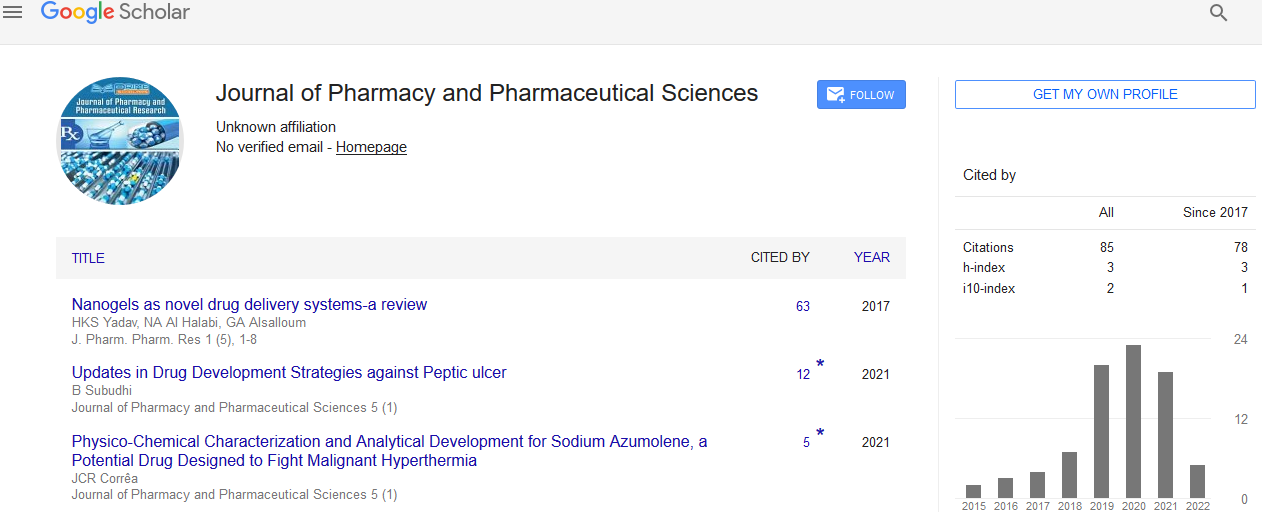Perspective - (2023) Volume 7, Issue 4
Unleashing the Power of Precision: The Evolution of Protein Drug Dosage Forms
Melissa Jason*
Department of Medicine, Alexandria University, Egypt
*Correspondence:
Melissa Jason,
Department of Medicine, Alexandria University,
Egypt,
Email:
Received: 29-Nov-2023, Manuscript No. IPIPR-24-18827 ;
Editor assigned: 01-Dec-2023, Pre QC No. IPIPR-24-18827 (PQ);
Reviewed: 15-Dec-2023, QC No. IPIPR-24-18827;
Revised: 20-Dec-2023, Manuscript No. IPIPR-24-18827 (R);
Published:
27-Dec-2023, DOI: 10.21767/ipipr.7.04.037
Introduction
The landscape of pharmaceuticals has witnessed a paradigm shift
with the advent of protein-based therapeutics, offering a new
frontier in the treatment of various diseases. Unlike traditional
small-molecule drugs, proteins present unique challenges due to
their complex structures and susceptibility to degradation. The
development of protein drug dosage forms has emerged as a
critical facet of pharmaceutical innovation, aiming to optimize the
delivery, stability, and efficacy of these therapeutic agents. This
article explores the intricacies of protein drug dosage forms, their
formulation strategies, and their transformative impact on modern
medicine. Proteins, including monoclonal antibodies, enzymes,
and peptides, have become indispensable in the treatment of
conditions ranging from autoimmune diseases to cancer. Their
specificity and ability to target intricate pathways make them
powerful therapeutic tools. However, the delicate nature of
proteins poses challenges in terms of formulation, administration,
and stability.
Description
Proteins are susceptible to degradation caused by factors such
as temperature, pH, and agitation. Ensuring stability throughout
the manufacturing process and during storage is paramount
to preserving their therapeutic efficacy. Proteins often require
parenteral administration due to poor oral bioavailability
and susceptibility to degradation in the gastrointestinal tract.
Developing alternative, patient-friendly routes of administration is
a key focus in protein drug formulation. Lyophilization, or freezedrying,
is a common technique for protein drug formulation. It
enhances stability by removing water content, allowing for longterm
storage and reconstitution before administration. Nanoformulations,
such as nanoparticles and liposomes, provide a
protective environment for proteins, preventing degradation and
enhancing bioavailability. These platforms also offer the potential
for targeted drug delivery. Formulating proteins as injectable
solutions requires careful consideration of pH, buffer systems, and
stabilizers to maintain protein stability. Prefilled syringes and autoinjectors
enhance ease of administration. Depot formulations offer
sustained release, reducing the frequency of administration. These
formulations involve encapsulating proteins in biodegradable
matrices, ensuring a gradual release over an extended period. The
development of protein drug dosage forms necessitates rigorous
quality control measures to guarantee safety, efficacy, and
consistency. Analytical techniques, such as mass spectrometry and
chromatography, are employed to assess the structural integrity
of proteins. Regulatory agencies require stringent validation
processes and documentation to ensure compliance with quality
standards. Patient adherence plays a pivotal role in the success of
protein-based therapies. The development of user-friendly dosage
forms aims to enhance patient experience and improve treatment
outcomes. Innovations in self-administration devices, prefilled
syringes, and wearable technologies contribute to a more patientcentric
approach, fostering better compliance and reducing the
burden on healthcare systems.
Conclusion
As research continues, the future of protein drug dosage forms
holds promise for advancements in stability, delivery, and
personalized medicine. Tailoring formulations to specific patient
populations, coupled with advances in nanotechnology and
targeted drug delivery, could revolutionize the landscape of
protein therapeutics. Protein drug dosage forms represent a
dynamic frontier in pharmaceutical science, paving the way for
more precise and effective treatments. The challenges associated
with protein drug formulation are met with innovative solutions
aimed at preserving the therapeutic potential of these complex
molecules. As technology advances and our understanding of
protein behavior deepens, the impact of protein drug dosage
forms on modern medicine is set to grow, offering new possibilities
for addressing previously untreatable conditions and improving
patient outcomes.
Citation: Jason M (2023) Unleashing the Power of Precision: The Evolution of Protein Drug Dosage Forms. J Pharm Pharm Res. 7:037
Copyright: © 2023 Jason M. This is an open-access article distributed under the terms of the Creative Commons Attribution License, which permits unrestricted use, distribution, and reproduction in any medium, provided the original author and source are credited.

